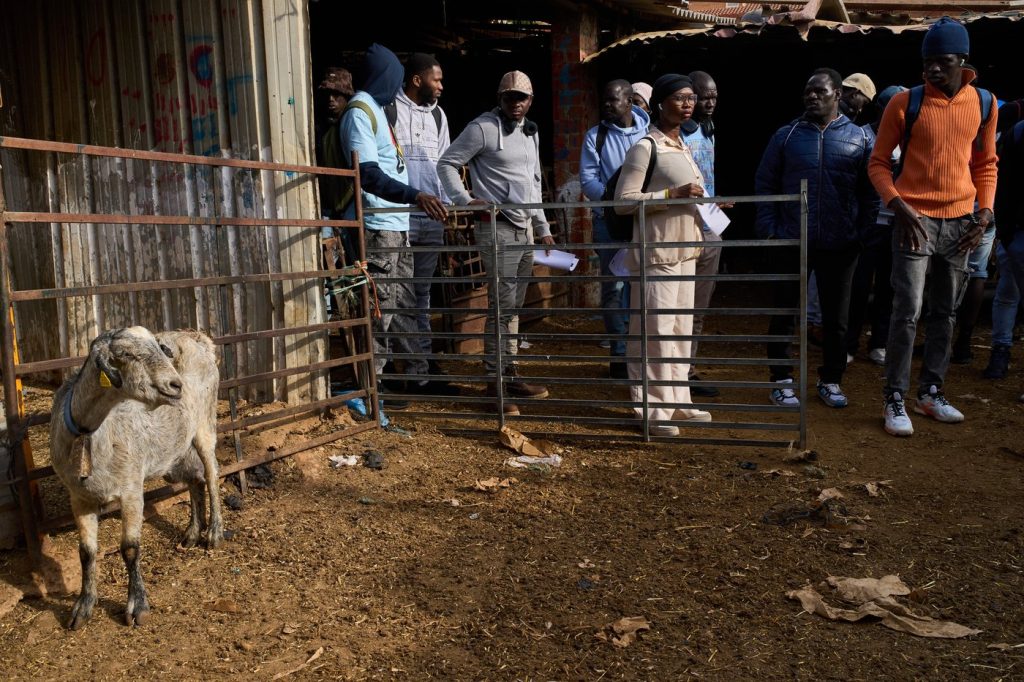LOS CORTIJOS, Spain (AP) — As the sun sets over a centuries-old farm in Spain's arid heartland, Osam Abdulmumen, a 25-year-old migrant from Sudan, herds a flock of 400 sheep back from pasture. This small village in Castile-La Mancha, known for its literary heritage from the 17th-century classic "Don Quixote," is grappling with a depopulation crisis that has affected various rural communities across the region.
Abdulmumen is part of a government program designed to address the labor shortages in rural areas, particularly in shepherding — an age-old profession now often neglected by local Spaniards. To fill this gap, the initiative trains recent migrants from Africa, Venezuela, and Afghanistan to work in shepherding roles that are crucial for producing prized sheep's milk cheese in central Spain.
Inside his modest one-bedroom apartment, Abdulmumen expressed his desire to support his family back home, who face difficulties due to ongoing violence in Sudan. He conveys that his aspirations include buying them a house and sending them financial help when possible.
Álvaro Esteban, the fifth-generation owner of the farm, has a personal stake in the labor shortages, having left Los Cortijos for nearly a decade to pursue his studies and work abroad before returning during the COVID-19 pandemic. At 32, Esteban has made efforts to modernize the family farm by integrating technology such as drones to monitor the flock and by producing cheese for markets and restaurants.
The ongoing demographic shift in Spain has resulted in about 81% of residents now living in urban centers, a significant increase from 60% in 1950. As a result, farmers represent less than 4% of the country's workforce despite Spain being one of Europe's leading agricultural producers. This rural exodus presents both struggles and opportunities in ensuring the agricultural sector remains vibrant.
Providing training in shepherding, the program is located in a classroom near the medieval city of Toledo, where newcomers learn sheep husbandry over five days. Participants, many of whom speak limited Spanish, are eager to learn skills that can lead them to employment on farms. Approximately 460 students have participated in the program since 2022, with many successfully securing jobs as shepherds or in related agricultural roles.
Sharifa Issah, a 27-year-old migrant from Ghana, shares that her previous experience tending animals inspired her to pursue this training. The program coordinator, Pedro Luna, reports there are now 51 graduates working as shepherds, along with others employed in various agricultural capacities, illustrating the program's success in addressing labor shortages.
Abdulmumen's journey to Spain was complex and fraught with challenges, beginning at 18 when he left Sudan for Egypt. After several years spent in various North African countries, he reached Ceuta, a Spanish enclave, where he sought asylum. Now settled in Los Cortijos, he feels isolated as one of only a few Africans in the village and often reflects on the limited social opportunities for young people in the area.
His day starts early with prayer, followed by long hours on the farm. He maintains contact with his family in Sudan, where a civil war has raged since April 2023, but communication is often interrupted due to unreliable cell service. Despite earning about 1,300 euros ($1,510) per month—slightly above Spain's minimum wage—he struggles with the emotional toll of separation from his family, last seen seven years ago.
Esteban highlights the vital role migrants like Abdulmumen play in sustaining livestock farms, cautioning that many farms would face closure within the next decade without this incoming labor force. He notes a growing reluctance among local youth to pursue agricultural jobs, indicating a deepening crisis in rural employment that needs urgent attention.
This situation underscores the importance of integrating migrants into the agricultural sector, providing both a solution for labor shortages in rural Spain and an opportunity for those seeking better lives after fleeing conflict and instability.










